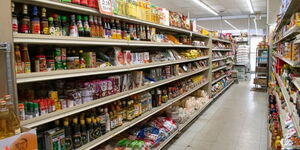The Kenya Bureau of Standards (KEBS) has directed all manufacturers and importers to ensure that they denature ethanol before release to the public.
In a public notice contained in a local daily, the standards enforcing agency explained that denaturing the product will demotivate dealers of illicit brew from exploiting the product which has been declared unfit for human consumption.
The agency revealed that the directive, which takes place immediately, is part of changes made by the Interior Ministry Cabinet Secretary Kithure Kindiki in the fight against illicit brew.
KEBS, therefore, mandated all manufacturers to ensure that the denaturation process is done before the product leaves their premises.
"Following the Government directive issued on 6th March 2024 on eradication of illicit brews, drug, and substance abuse, all locally produced Ethanol and Ethanol imported into Kenya designated for industrial use shall be required to be denatured using ‘Denatonium benzoate’ as a denaturant to prevent misuse," read the notice in part.
"Such misuse includes, but is not limited to, diverting Ethanol designated for industrial use (which is not fit for human consumption) as a raw material in the manufacture of alcoholic beverages.
"Evidence of denaturation shall be required before the Ethanol designated for industrial use is cleared for release from the manufacturers’ premises, for locally produced Ethanol, or at the Ports of entry for imported Ethanol," the agency added.
Since the beginning of March, the Ministry of Interior has been conducting a crackdown in partnership with the office of Deputy President Rigathi Gachagua aimed at ending the proliferation of illicit brew.
So far, over 18,000 businesses have been shut for either running illegal joints without requisite permits or opening bars and nightclubs within estates destabilise communities.
The Ministry also revoked all licenses awarded to second-generation alcoholic beverage manufacturers and directed them to re-apply afresh. The applicants will undergo a vetting process before they are awarded.
Last week, a committee headed by Interior Principal Secretary Raymond Omollo was formed and tasked with vetting the companies.
The committee, chaired by the PS, held a consultative meeting on March 12 which was attended by 55 out of 64 alcoholic drinks manufacturers.
"The focus will be on spirit manufacturers, with over 29 premises expected to undergo examination. Already, 35 companies have been identified as having their licenses either previously suspended, canceled, or found dormant," he announced.
"The verification exercise mandates that manufacturers install quality control laboratories equipped with specialized testing apparatus and qualified personnel, ensuring rigorous scrutiny of raw materials and finished products."












